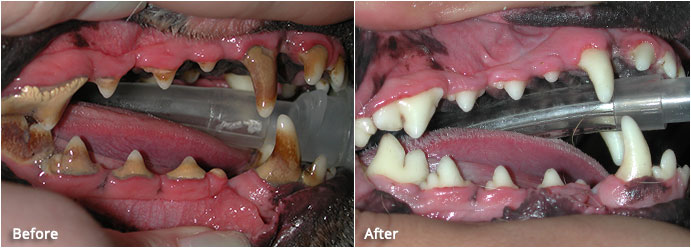Pet Dental Care
Pet Dental Care

Pets have dental diseases and problems just like people do. Regular dental check-ups at Brewster Veterinary Hospital, combined with good dental hygiene at home, can increase your pet's health, vitality, and well-being while ensuring your pet leads the best life possible.
If left untreated, dental disease can not only be painful and inhibit proper nutrition, but it can also lead to serious systemic issues that may threaten your pet's overall health before symptoms are noticeable. For those reasons, our Brewster Veterinary team strongly considers dental care an important piece of your dog's or cat's preventive health care program.
Protecting Your Pet's Dental Health
Dr. Kaser and staff believe that the centerpiece of good dental care is a complete oral exam followed by a thorough cleaning designed to remove plaque and slow its buildup. Some of the dental services we provide are prophylaxis (routine periodontal),extractions and polishing. We also use ultrasonic scalers for cleanings.
At our veterinary hospital in Brewster, your pet's dental appointment includes:
- Oral examinations under anesthesia
- Diagnosis and treatment of periodontal disease
- Supra and subgingival scaling
- Tooth extractions
- Polishing
- Irrigation
Should we find any issues—such as evidence of gum or tooth erosion, gingivitis, or excessive plaque buildup—we will discuss this with you and offer treatment options for your pet. We are experienced dental practitioners and are capable of offering a number of dental procedures and oral surgeries.

In Between Cleanings: Dental Care at Home
You can prevent serious dental problems by making sure your pet receives dental exams at the time of each vaccination, again at 6 months of age, and then annually. In between visits to your veterinarian at Brewster Veterinary Hospital, check your pet's teeth regularly for signs of problems. Brushing your pet's teeth is the single most important procedure you can do to maintain good oral health. If performed regularly, brushing dramatically decreases the incidence of gingivitis and can increase the interval between teeth cleaning appointments.
If you are unsure of how to brush your pet's teeth, please ask a staff member at Brewster Veterinary Hospital for instructions.
Symptoms of dental disease include:
- Bad breath (one of the first signs of dental disease)
- A yellowish-brown crust of plaque on the teeth near the gum line
- Red and swollen gums
- Pain or bleeding when your pet eats or when the mouth or gums are touched
- Decreased appetite or difficulty eating
- Loose or missing teeth
If your pet is experiencing any of the above symptoms, please call Brewster Veterinary Hospital today at (508) 896-2540 for an appointment. Your pet does not need to spend any more time suffering with oral discomfort.


